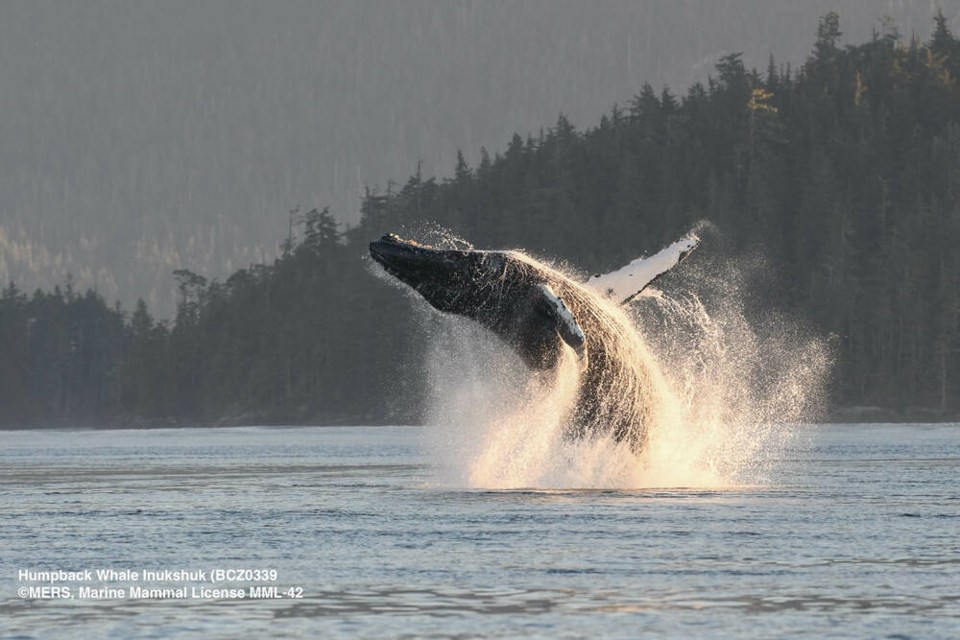A north Island humpback whale researcher can’t quite believe that she’ll soon hear the legendary David Attenborough, “the voice of god,” speaking on film the names she has given to whales that she has observed for years.
Jackie Hildering, a researcher at Marine Education and Research Society in Port McNeill, worked with a crew from BBC’s Planet Earth III to capture footage of humpback whales in Blackfish Sound, just off the coast of Vancouver Island near Telegraph Cove.
Hildering said it is surreal to know that Attenborough, who narrates the nature documentary series, will be describing the behaviours of whales she knows so well.
“I will hear the voice of god say the name of Conger the humpback whale, who we named years ago,” she said.
Hildering was approached by producer and director Fredi Devas, who visited the area for an orientation in 2019, and returned to film over a six-week period in 2021 and 2022.
The team captured footage of humpback whales practising “trap feeding,” a method of feeding that Hildering and others at MERS first documented in 2011. The humpbacks set a “trap” for juvenile herring by opening their mouths when the fish are looking for shelter from diving birds. The fish race into the whale’s mouth or nearby and the whale spins and sometimes uses its pectoral flippers to push the fish into its mouth.
The method uses less energy than the more common lunge-feeding, which involves swimming quickly with an open mouth to capture fish.
Researchers at MERS have documented 32 individual humpbacks that are using the trap feeding strategy.
The BBC crew spent long days on the water on a 17-foot boat, with Hildering at the helm, watching Conger, the first humpback Hildering’s team ever saw practising trap feeding. They faced challenging weather and other animals getting in the way of the shots they wanted.
“You know what beautiful Planet Earth footage is like. It’s that slow moving, amazing footage. Imagine being the boat driver that has to make sure that that happens,” she said.
The crew captured video of Conger trap feeding from the boat level and from drones, and filmed multiple humpbacks trap feeding at once.
Featured in Episode 7 of Planet Earth’s third season, the humpback footage is part of a story that explores the relationship between wildlife and humans and how animals are adapting to people encroaching on their space.
It looks at how long-tailed macaques in Bali have learned to steal items from tourists to coerce the tourist into trading food for their cellphone, and and how Tawny frogmouth birds in Melbourne, Australia, are using streetlights to help them find prey and are now found in higher density in parts of the city than in the countryside.
The episode also takes viewers to Nepal, Kenya, Brazil, India, New York and Lake Tahoe to examine the lives of monocled cobras, African elephants and pavement ants, among others.
The humpback story is one of hope, Hildering said. “This provides a message of: Look what happens when the giants come back.”
In addition to the unique feeding behaviour, the humpback sequence examines the role whales play in combating climate change. When whales defecate at the surface of the ocean, the iron-rich whale poo is absorbed by phytoplankton, leading to a population boom. As the phytoplankton photosynthesize in larger numbers, they draw more carbon out of the atmosphere.
Hildering will be at a watch party in Bristol, U.K., when the episode premieres there on Dec. 3. Episode 7 premieres in Canada in March and Hildering plans to tour around B.C. presenting the show.
Hildering said she hopes the episode instils in viewers a love for the whales and a desire to make lifestyle choices that are in the animal’s best interest, such as avoiding ordering goods from far away that will contribute to vessels in the ocean, increasing noise in the water and the likelihood of collisions.



